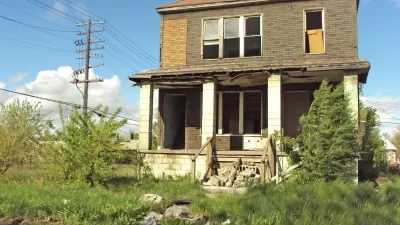A new law makes it impossible for property owners delinquent on their property taxes to bid in a foreclosure auction to keep their homes. Larger, commercial interests are benefitting from the change.
"Each September, Wayne County puts up for auction tens of thousands of properties whose owners are more than three years behind on their property taxes," according to a post by Kriston Capps.
The occasion is something of an anti-holiday in Wayne County, according to Capps, because of how many owners and tenants lose their homes in the process. "This year’s auction—which…runs through September 24—includes more than 8,000 homes occupied by an owner or a tenant, according to the county’s own records." The 8,000 residents losing their homes are casualties in the city's record-high 75,000 tax foreclosures this year. Capps notes that the majority of those foreclosures happen in Detroit.
But, Capps is careful to explain, those numbers don't tell the whole story. The foreclosures indicate a real threat to equity in the county and the city: "Recent changes to the law mean that it’s harder for occupant-owners to bid to save their homes—and easier for buyers to take or keep scores of properties for investment purposes." The bulk of the article is devoted to unpacking the change in the law that regulated tax foreclosures as well as the consequences of those changes.
FULL STORY: How Detroit's Foreclosure Auction Fails Homeowners

Alabama: Trump Terminates Settlements for Black Communities Harmed By Raw Sewage
Trump deemed the landmark civil rights agreement “illegal DEI and environmental justice policy.”

Planetizen Federal Action Tracker
A weekly monitor of how Trump’s orders and actions are impacting planners and planning in America.

The 120 Year Old Tiny Home Villages That Sheltered San Francisco’s Earthquake Refugees
More than a century ago, San Francisco mobilized to house thousands of residents displaced by the 1906 earthquake. Could their strategy offer a model for the present?

In Both Crashes and Crime, Public Transportation is Far Safer than Driving
Contrary to popular assumptions, public transportation has far lower crash and crime rates than automobile travel. For safer communities, improve and encourage transit travel.

Report: Zoning Reforms Should Complement Nashville’s Ambitious Transit Plan
Without reform, restrictive zoning codes will limit the impact of the city’s planned transit expansion and could exclude some of the residents who depend on transit the most.

Judge Orders Release of Frozen IRA, IIJA Funding
The decision is a victory for environmental groups who charged that freezing funds for critical infrastructure and disaster response programs caused “real and irreparable harm” to communities.
Urban Design for Planners 1: Software Tools
This six-course series explores essential urban design concepts using open source software and equips planners with the tools they need to participate fully in the urban design process.
Planning for Universal Design
Learn the tools for implementing Universal Design in planning regulations.
Clanton & Associates, Inc.
Jessamine County Fiscal Court
Institute for Housing and Urban Development Studies (IHS)
City of Grandview
Harvard GSD Executive Education
Toledo-Lucas County Plan Commissions
Salt Lake City
NYU Wagner Graduate School of Public Service




























